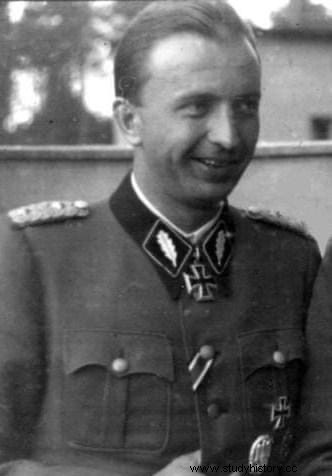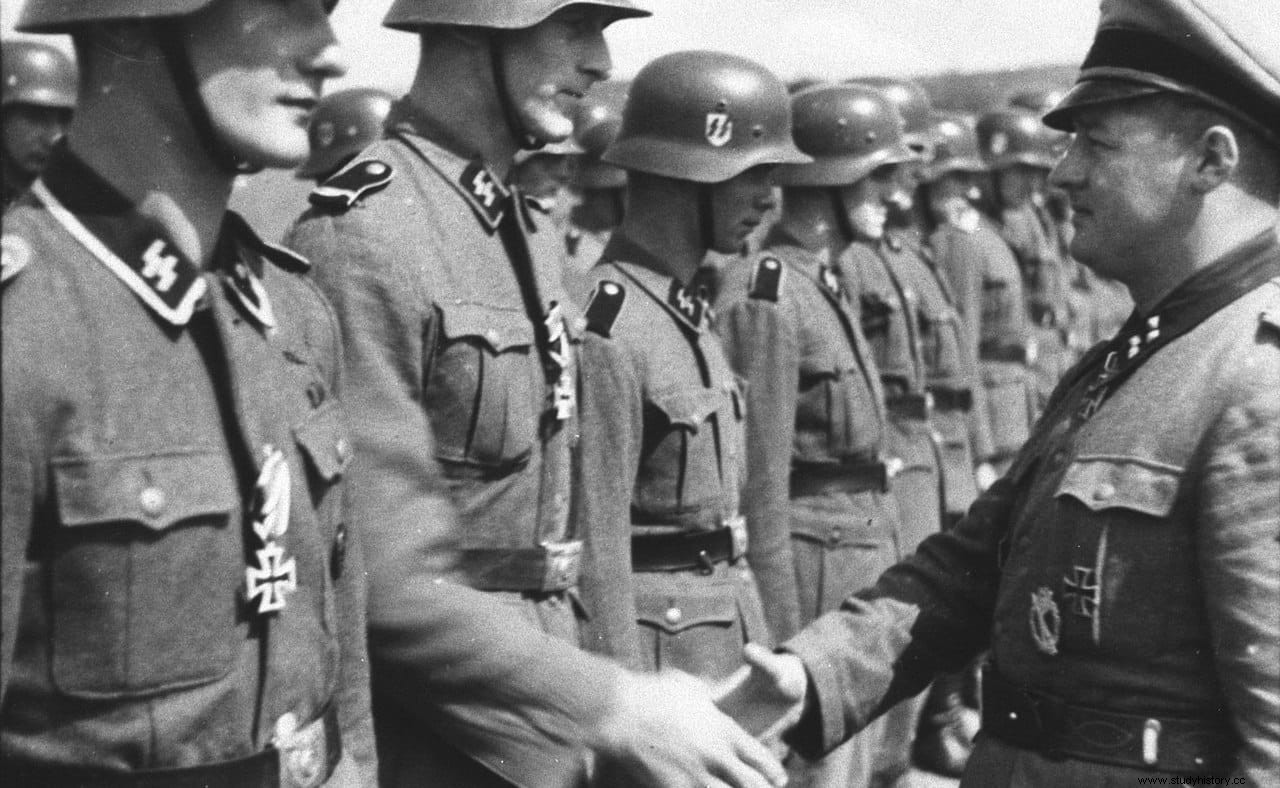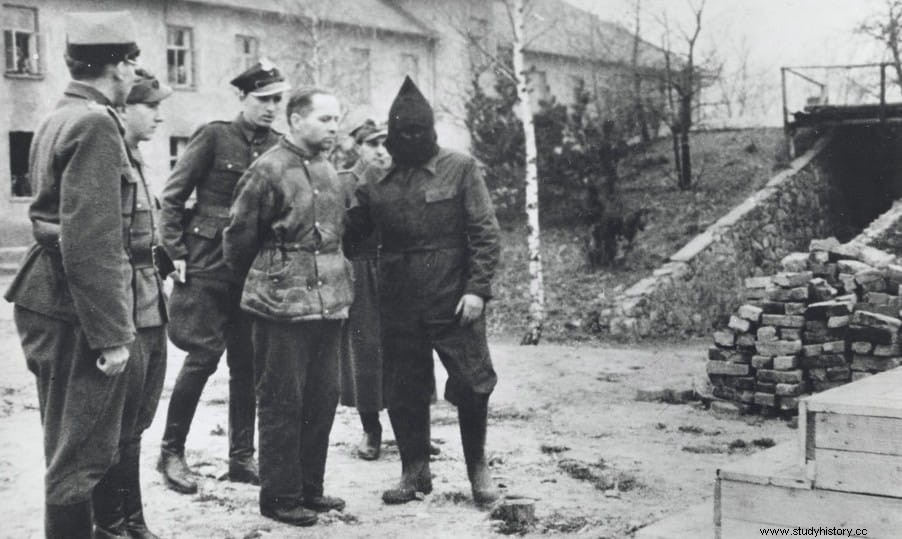The title sounds like an oxymoron but it happened as it is. On May 15, 1961, during the thirty-ninth session of the trial to which he was subjected in Israel and as part of his defense against charges of genocide against him, Adolf Eichmann based part of his argument on the fact that he was obeying orders without necessarily being in agreement. agreement with them and that proof of this was that even an SS judge had filed an indictment against him. In the latter he was telling the truth, although that car was nothing more than embezzlement. The magistrate who issued it was named Georg Konrad Morgen and had become the scourge of the corrupt SS.
Morgen was born in Frankfurt in mid-1909, the son of a locomotive engineer. He started in the world of work working in a bank but left to study law at the university in his hometown, later expanding his curriculum at the International Academy in The Hague, apart from other locations such as Berlin, Rome and Kiel. While doing his degree he entered the university section of the DVP ( Deutsche Volkspartei , German People's Party), heir to the NLP (German Liberal Party), whose postulates were monarchical, conservative and nationalist.

In 1933, with the rise to power of Adolf Hitler, the new government dissolved that formation and many of its members went over to the NSDAP (Nationalsozialistische Deutsche Arbeiterpartei , National Socialist German Workers' Party). Morgen was one of them, shortly after entering the SS (Schutzstaffel , Protection Squads), the Nazi paramilitary organization that was in charge of everything related to their security at venues, meetings and rallies.
All this did not deviate Morgen from his professional orientation and in April 1939 he obtained the appointment of judge of the town of Szczecin, in Western Pomerania. He did not last long in office because a dark incident led to his dismissal; he apparently acquitted a teacher who had gone too far in applying corporal punishment to a student said to be a member of the Hitler Youth, and the latter managed to take revenge. The fact is that a few months later the Second World War broke out and the idle judge served in the ranks of the Waffen SS, taking part in the invasion of France in 1940.
It was practically his last service of arms because once the country was occupied, and with the British expelled from the continent, it was time to administer. Thus, they demobilized him to appoint him a judge of the Judicial Court of the SS. This organization had its headquarters in Munich but Morgen obtained a further destination, the court of Krakow, where he was sent at the beginning of 1941. There he began his activity persecuting the corruption that had been installed within the SS.; he prosecuted several officers, among whom was Hermann Fegelein, without it being useful for him to be Himmler's personal assistant (and future brother-in-law of Eva Braun, since in 1944 he would marry his sister Gretl). Morgen accused Fegelein of keeping jewelry seized from Jews and of taking over a company with the help of a mistress who was also suspected of working for Polish intelligence; he soon added a more serious charge, that of rape.
Himmler's intervention put an end to the investigation of the process and the judge's stay in Poland, since his zeal in his work, pursuing irregularities such as misappropriations or relations with people of another race, had caused unease among many SS. Morgen, demoted to lieutenant, was attached to the 5th SS Panzergrenadier Division Wiking , originally called Germana but that he changed his name to the numerous Norsemen who were in his ranks. The Wiking he fought on the Eastern Front, mainly in the Soviet Union and, more specifically, in the Caucasus.

In mid-1943 he was in the Ukraine, where the Battle of Kharlov had just begun, but around this time Morgen received a direct order from Himmler to travel to Berlin to join the RKPA ( Reichskriminalpolizeiamt , Reich Criminal Police Office), created in 1937 by Arthur Nebe (which, paradoxically, in 1944 would form part of Operation Valkyrie and he would be about to escape by simulating his suicide, although in the end they caught him and hanged him). The functions of this police agency were to prosecute common crime, from counterfeiting to drug trafficking, through pickpocketing, illegal gambling, pornography, fraud, etc.
Morgen's mission, once again, was to deal with the corruption detected in the SS leadership on duty in the concentration camps, which had become endemic. His first performance was in Buchenwald, investigating Major Karl-Otto Koch and his wife Ilsa, along with Martin Sommer and Dr. Waldemar Hoven. He accused the couple of corruption, fraud, embezzlement, drunkenness, sexual crimes and murder, nothing less, causing him to be transferred to the Majdanek camp. Koch diverted money from the SS to various accounts in his name, stole property from prisoners and had ordered several crimes, including that of his own doctor so that he would not reveal that he had syphilis, for which he was shot just a few days before he died. the Americans liberated the camp.
Ilse, aka the Witch of Buchenwald She was reputed to be involved in human experimentation and torture, although her most famous accusation against her was that of using the skin of prisoners to make lampshades. The latter would not be given credence in her trial, in which Morgen's summary was essential, both to accuse her of some things and to exonerate her of the lamps, but even so the other charges earned her the chain life; she did not fully comply because in 1967 she hanged herself at the age of sixty-one.
As for Sommer and Hoven, the former was a sadist who enjoyed torturing prisoners even beyond what the guards themselves did. He lost him the murder of two priests, one a Protestant whom he left to freeze naked in the open air in the dead of German winter after throwing a bucket of water at him, and another Catholic, whom he beat to death. Demoted and sent to a punishment battalion, he was maimed in action and captured by the Red Army, who returned him to Germany in 1955. There he was tried two years later and jailed for life.
Finally, Dr. Hoven, a Buchenwald physician, was prosecuted by Morgen for the murder of an SS officer who could testify against him during the Ilse Koch investigation, because he was apparently having an affair with her. He was sentenced to death but escaped due to the need for doctors at this point in the war, although only until 1948, when the executors were the allies.
Morgen's work was not limited to Buchenwald. He then reviewed the reports against Christian Wirth, supervisor of the extermination camps where Operation Reinhard was taking place. , that is, the systematic slaughter of more than a million and a half Polish Jews and Gypsies that can be considered the prologue to the Holocaust and that was named after its designer, Reinhard Heydrich. The three camps in question were Treblinka, Sobibor and Belzec.
Originally Wirth, nicknamed Christian the Wild for obvious reasons, he would have allowed his officers to participate in a Jewish wedding while drunk; but pulling the rope, the judge discovered much more serious things about him, such as the appropriation of valuables from his victims and the mass executions of prisoners when some weapons were discovered. Forty-three thousand people were shot for that, exhausting the SS so much that it was one of the causes that led to the introduction of the use of gas in the future.

The other extermination camp where he worked was Auschwitz-Birkenau, as a result of which the postal inspection intercepted a package full of gold teeth from prisoners sent illegally by one of the people in charge of the health service. The magistrate himself appeared there and, as in the previous cases, when investigating, more things turned up, deciding to prosecute the camp commander, Rudolf Höss, and the head of the local Gestapo, Maximilian Grabner, accusing them of murdering the inmates to profit from their belongings. As you can imagine, his presence was not well received; a proverbially random fire burned down the archives and one of his aides, SS-Stabsscharführer Gerhard Putsch, was never seen again.
Höss and Graben got off when their trials were suspended sine die (although they were hanged after the war) but Morgen still continued to pester other camps. He opened nearly eight hundred lawsuits, of which about two hundred made it to the end. The commanders of Dachau, Flössenburg, Herzogenbusch, Sachsenhausen and Lublin were indicted for various crimes ranging from the most minor (drunkenness, scandalous life, mistreatment) to the serious (corruption, murder). All received sentences and degradation except Hermann Florstedt, commander of Lublin, who ended up on the scaffold.
Despite all this, Georg Konrad Morgen was a convinced Nazi who simply put the law before his ideology. In fact, after the war he was one of the defense witnesses at the Nuremberg trials and although he claimed to have been beaten by his captors to endorse the exaggerations about Ilse Koch, he refused. He also insisted on painting an almost idyllic image of the concentration camps, where only the deviations of some commands were punishable; he even pointed out that in Buchenwald the inmates had a cinema, a library and even a brothel.
In that sense, he assured that the extermination of prisoners horrified him -especially the one unleashed by Wirth because he was totally unexpected-, because although he generally detested the Jews he had nothing personal against them nor was there -until the Solution ending – no law allowing them to be killed; this, he said, was legalized by Hitler once he had already started. Likewise, he explained that the processes that he opened against the commanders were intended to stop the killings, a compromise action that he opted for instead of escaping to Switzerland, as he had initially thought. Something that generated controversy because others believed that his actions only began because many had been killed for witnessing corruption. Furthermore, it was said that Morgen was not actually opposed to the fields but to the corrupting effect they had on his command.
In any case, he was able to continue his legal career in Frankfurt. He retired in 1979 and passed away three years later.
